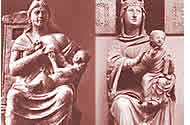| |||||||||||||||||||||||||||||||||
| Reasons > Borrowing > The Bible is True |
| Reasons
> |
Choices | Borrowing | Different | The Bible is true | |
| First | Independently | From Judaism | Xerox copying |
| |
 |
These writers are necessarily in the same strait
and invent apparitions of heroes and gods, since the beginnings on which
they build are false and improbable; for how is it possible to finish
conformably to reason what has been begun in defiance of it ? |
 |
|
|
OK, so here's where we are. The ancient evidence under the Facts bar has proven lots of Pagan-Christian similarities. In this Reasons part of POCM we're going through the possible explanations of those similarities, looking at which explanations are comprehensive and consistent. And which aren't. |
|
I get this email a lot: "Jesus could not possibly be a copy of some Pagan God, because we know exactly how Christianity got its ideas—from Jesus. The eucharist wasn't a knock off of Pagan mystery meals-with-the God, the eucharist was a celebration instituted in a historical place, at a historical time, by a historical man. Jesus. And Jesus wasn't copying Mithras. The New Testament gospels are accurate, first hand histories written by people who knew Jesus and recorded His teachings. Christian rituals and theologies are found in those teachings." |
Flat-Earth
Superstition There is a vast and detailed scholarly literature describing why the
gospels can not be historical. POCM has (or will eventually have) an
outline of a few of the main
points, People of good will can disagree, of course, but my own
experience is that the the gospels are NOT histories reasoning
is convincing and The Bible is True scholarship is all in-house
stuff, "scholarship" about how the bible is true,
not whether is is true. Which is why it is only circulated in house. Like the faithful man at the casino, The Bible is True advocates cling stubbornly to beliefs contradicted by clear and convincing evidence to the contrary. A theory like that cannot be distinguished from flat-Earth superstition. There, I said it and I feel better. |
The Bible is True has a couple other problems. It is not Comprehensive. It is non consistent. Comprehensive Sort of Consistent |
|
||
Good Books for this section
| The Life
of Jesus Critically Examined
|
What you'll find:
|
|
Ancient Christian Gospels Their History and Development
|
Do you know the oldest surviving manuscript for John? How about Mark, Matthew, Luke? When were each of the gospels first mentioned by another Christian writer? What is the evidence about who wrote them? How about the Gospel of Thomas, the Egerton Gospel, the Synoptic Sayings Source, and other early non-canonical gospels? They're here too. You'll even find detailed analysis of the late first and early second century Apostolic Fathers' (Clement, Polycarp, Ignatius) gospel quotations. [Hint—there aren't any; but the Apostolic Fathers did quote gospel-like saying of Jesus from other sources.] Why does this matter? Because it shows that the gospels themselves are not reflected in any Christian records until the second half of the second century! A well written, readable, but extremely technical scholarly analysis of the early Christian writings. Too detailed for beginners, but a fascinating read for advanced students and an excellent reference.
|
| The
Early History of God
|
Like Christianity, Judaism had Pagan origins. Sound kooky? It's mainstream scholarship, though you don't come across it often. This well written, easy to read book is by one of the preeminent experts in the field. Jewish ritual and mythology developed directly from Canaanite ritual and mythology. Yahweh was originally the son of the Canaanite God El and brother of the Canaanite God Baal. How do we know this? Ugarit. In 1927 they dug up a Canaanite clay tablet library buried at Ugarit, an ancient city along the northern coast of Syria. Hundreds of ancient texts. Same myths. Same rituals. Same Gods. Only centuries earlier than Judaism. Who knew?
|
Gospel Truth
|
Instead of pushing his own theories and opinions, Shorto describes the spectrum of modern scholarly opinion, from Jesus-is-a-myth to the-gospels-are-history. You get the names leading scholars in each camp, with a synopsis of their opinions—a great aid to your further reading. Absolutely the best introduction to modern New Testament scholarship, because it's written not by a scholar with an opinion to sell, but by an interested but dispassionate professional magazine writer who researched all sides of the issue and who knows how to write clearly. The result is a clear and easy to read overview of modern New Testament scholarship, from Old Testament prophecy through resurrection and on to how modern pastors include, or ignore, NT scholarship in their daily ministry.
|
Introduction
to the New Testament
|
This book is a treasure—an excellent place for new students to start and a valuable reference if you already know plenty. A clearly written, readable roundup of modern New Testament scholarship by a giant in the field. Includes the history of who wrote what, when—and who copied from whom. Not just the canonical books, but also Q, the Gospels of Thomas, Hebrews, etc. etc. Wow. Also details the history of which sects developed in each region, when. Not what you learned in Sunday school. Highly recommended for any serious student.
|









